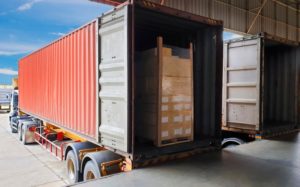This health crisis is having a very real impact on driver control operations.
It should be remembered that the general standard contract in its article 7.2 normally provides for the visual control of the goods, the wedging and stowage by the driver.

However, drivers are regularly forced to stay outside the warehouses as part of the fight against the pandemic.
The decree of October 16, 2020 (D. no2020-1262, Oct. 16, 2020, JO Oct. 17) stipulates however in its article 22 “III. – – When loading or unloading areas are not provided with a water and soap point, they are provided with hydro-alcoholic gel. A driver of a freight truck may not be refused access to a loading or unloading area, including a water point, ifthe area is equipped with one.” This article specifies that these provisions are of public order and cannot be modified by either of the parties.
This article specifies that these provisions are of public order and cannot be modified by either of the parties.
Nevertheless, in practice, many companies continue to prohibit the entry of drivers, thus preventing their obligation of visual control.
It is up to the driver to indicate this on the consignment note.

